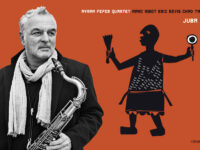Feature photo: Shane Nelson
(Above video is by Avram Fefer Trio, not Quartet.)
It’s been some time since we last examined an Avram Fefer record, but Eliyahu from 2011 made the right impression that lingers today. Fefer was and remains “one of the most diverse sax players around, applying his skills to avant funk, trip-hop, jungle, drum ‘n bass, improvised music, modern jazz, and even Afro-Hungarian jazz.”
Moreover, he’s still fronting that potent Eric Revis (bass)/Chad Taylor (drums) rhythm section, which is understandable since both are about as good as you can get for their respective instruments. For Testament, the three are joined by someone who is about as good as they come on guitar: Marc Ribot.
Add to that Fefer’s past associations with the likes of Archie Shepp, Sunny Murray, David Murray and Michael Bisio, it safe to state that Fefer’s been hanging around the outer side of jazz; Testament is daring and adventurous like all of these guys. For instance, “Parable” is what an Ornette Coleman Atlantic side might have sounded like if he had replaced Don Cherry’s trumpet with Ribot’s guitar, but Fefer’s passionate tenor sounds like no other.
“Testament” reflects Fefer fascination with Middle Eastern music, and this song also shows Indian influences as well. After stating the main motif with Ribot, Fefer dives headlong into a charged but controlled solo, as the all-world rhythms section rejects any notion of stasis or preconceived patterns. Ribot, of course, is right in his element and mines this Third World vibe for all its worth.
On the other hand, “Dean St. Hustle” is bebop, pure and simple. But it’s good to hear the ebullience Ribot, Revis and especially Taylor put into it. “Essaouira” confidently grooves in a straightforward manner, urging Fefer to reach deeper and higher on his extensive asides.
“African Interlude” connects back to Coltrane’s Workman/Tyner/Jones era, with Fefer’s frisky interplay with Ribot offering a different twist. Fefer peels away and recreates Trane’s urgency without mimicking the diction. “Song For Dyani” is also Coltranian, not for Eastern influences but for its pure spirituality. First that extended motif pours out like water, and than buttressed by wiry, counterpoint bass line.
A key bass figure — a circular one — also paces “Magic Mountain” but gets broken up by breakdown moments that serve as occasions for Fefer and Ribot to go free and later, Ribot settles into a solo that shifts away from jazz to searing rock. No one familiar with him would be surprised by that, but then Fefer joins him playing wailing in much the same way as the guitarist.
All this is to say that I’m left wondering why — as I was about eight years prior — isn’t Avram Fefer more widely noticed. He consistently brings the goods in composition, technique and sidemen…and delivers.
Testament is due out November 8, 2019 from Clean Feed Records.




